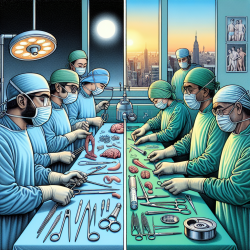Empowering Practitioners: Embrace the Power of Standardization in Surgical Skills
In the ever-evolving field of medicine, the ability to adapt and enhance surgical skills is paramount. The research paper "Surgical Skills Beyond Scientific Management" by Nicholas Whitfield provides a compelling exploration of how standardization and scientific management can elevate surgical practices. This blog delves into the key insights from the paper and offers practical guidance for practitioners seeking to improve their skills and outcomes.
Understanding the Carrel-Dakin Method
The Carrel-Dakin method, developed during the Great War by French surgeon Alexis Carrel and English chemist Henry Dakin, revolutionized the treatment of infected wounds. Their antiseptic approach emphasized standardization and scientific principles, challenging traditional surgical practices. By examining this historical context, we can glean valuable lessons for modern practitioners.
The Power of Standardization
Standardization, often associated with scientific management, has been a double-edged sword in the medical field. While some critics argue that it leads to deskilling, the Carrel-Dakin method demonstrates that standardization can enhance surgical skills. By adhering to precise protocols and techniques, practitioners can achieve consistent and improved outcomes.
Key Insights for Practitioners
- Embrace Scientific Principles: The Carrel-Dakin method highlights the importance of integrating scientific principles into surgical practice. By grounding techniques in evidence-based research, practitioners can enhance their skills and deliver better patient outcomes.
- Focus on Skill Development: Rather than viewing standardization as a limitation, practitioners should see it as an opportunity for skill development. By mastering standardized techniques, surgeons can refine their expertise and achieve greater precision in their work.
- Collaborate and Learn: The success of the Carrel-Dakin method relied on collaboration between surgeons, chemists, and other experts. Practitioners should seek opportunities for interdisciplinary collaboration and continuous learning to stay at the forefront of surgical innovation.
Encouraging Further Research
While the Carrel-Dakin method provides valuable insights, it also underscores the need for ongoing research and innovation. Practitioners are encouraged to explore new techniques, technologies, and approaches that can further enhance surgical skills and patient care.
To read the original research paper, please follow this link: Surgical Skills Beyond Scientific Management.










